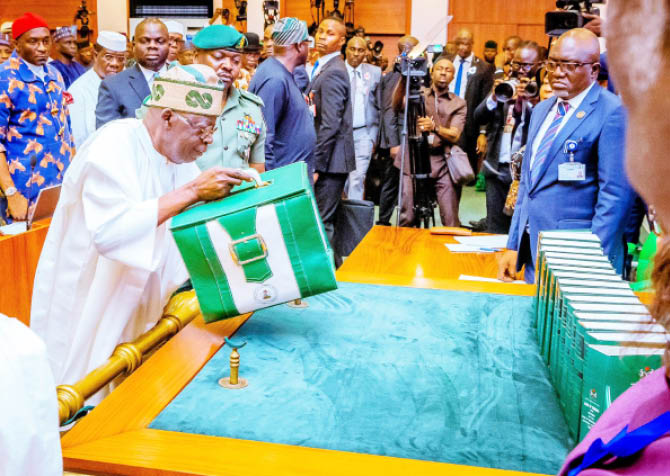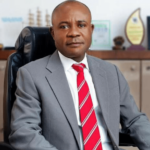We are here again.
In the recent past, Africa’s largest economy has made a mockery of the word ‘budget’. Year after year, the government presents a budget that is unrealistic, heavily padded (I believe this word was created solely to be used as a prefix describing Nigeria’s budget by brilliant linguists. Because, frankly, no other word does justice) and filled with enough loopholes that the corrupt will use to their advantage. Every year, it is the same story- we exceed our budget and ‘supplementary budgets’ are hastily presented in the ember months to finance unfinished projects and pay the wailing civil servants.
This year, Oga Presido intends to do things a bit differently. The presidency has presented a budget extraordinaire. The budget to end all budgets! The emperor, the conqueror, the champion, and the lion of all budgets!
And it is called, drum roll please, the budget of Renewed Hope!
Traditionally, a national budget is supposed to showcase a country’s economic trends, government priorities, and overall fiscal management. Most times, very few people pay attention to the details of the intricacies of a budget. To lay people like us, who are not economists, the budget used to be something we heard snippets of, and our attention was limited to the news titbits that run across our TV screens when we happen to glance at it.
Tudun Biri bombing: Community leaders deny suing FG
FG to overhaul education sector – Minister
However, it has all changed. People are no more smiling and the recent inflation rate and economic crisis in the country has made even the most aloof person to take more than a passing glance at the country’s budget. We are now wondering- Where is the money? Why is security being underfunded? What about health? Is this budget realistic? Do government priorities align with the mass’s priorities?
Questions, questions, questions.
The proposed Federal Government of Nigeria budget for 2024, is based on some key parameters. These include an oil price benchmark of $77.96 per barrel, a daily oil production estimate of 1.78 million barrels, and an exchange rate of N750.00 per US Dollar. The proposed 2024 budget presented before the National Assembly on 29th November 2023, showed a significant increase in revenue from N9.73 trillion in 2023 to N18.32 trillion in 2024, representing an 88% increase. The 2024 aggregate expenditure is estimated at N27.50 trillion which is 10.8 percent higher than N24.82 trillion in 2023, according to the public presentation by Abubakar Bagudu, minister of Budget and Economic Planning.
The Nigerian Government intends to spend 30 percent of its 2024 budget on debt servicing, allocating less to critical sectors of the economy. The big goons- Education and Health were allocated N2.18 trillion (7.9 %) and N1.33 trillion (5.03%) respectively.
For the purpose of this article, I will be limiting myself to the health sector only.
The health sector was allocated N1.33 trillion in the budget which is five per cent of the total budget. The amount provided for the Federal Ministry of Health and its agencies (recurrent and capital expenditure) stood at N1.07 trillion, Gavi/Immunisation funds, including Counterpart Funding for Donor Supported Programmes at N137.21 billion, transfer to Basic Healthcare Provision Fund was one percent of CRF at N125.74 billion.
Let the information sink in: Only 5.3% of Nigeria’s budget has been allocated to healthcare. This is a far cry from the Abuja declaration in 2001, where the country pledged to increase the government’s health budget by 15%. So far, the highest Nigeria has allocated to health was 6.23% in 2012 during President Jonathan’s era. Let us not forget that, at the beginning of this government, the current administration pledged to increase the allocation for health to 10% of the total budgetary allocation. Five months later- story don change.
According to the assessment of Nigeria’s 2024 budget by development Research and Projects Centre (dRPC) the proposed healthcare funding for 2024 may be impacted by key economic parameters such as increasing inflation and exchange rates. From December 2022 to October 2023 , the inflation rate has risen by 5.99 percentage points, reaching 27.33%. In October 2023, the inflation rate surged by 28.06 percentage points compared to the rate from December 2022. Additionally, the exchange rate has risen by 75.25% from N450.71/US$ in December 2022 to N789.9/US$ as of November 30, 2023. These economic indicators show a lack of coherence between the growth in healthcare financing and the increases in the inflation rate and exchange rate. It highlights the intricate interplay of economic variables and raises concerns about the sustainability and efficacy of the current health financing strategy amid the evolving economic landscape.
The analysis by dPRC further reiterates that the Federal Government of Nigeria (FGN) pledged to provide affordable healthcare for all citizens and “reduce out-of-pocket spending, irrespective of income and status” through the Coordinating Honorable Minister of Health and Social Welfare’s Health Sector Blueprint for UHC. The Nigerian government aims to achieve this by reducing out-of-pocket expenses, improving government spending efficiency, and reducing the financial burden on the poor. However, the proposed healthcare budget allocation for 2024 indicates marginally increased spending of N6,326 per person, compared to the average health spending per person of N4,431 in the last five years. The report states that while there is still a long way to go to achieve a more robust commitment to healthcare, this is a step in the right direction to reduce the financial burden on those who cannot afford quality healthcare and ultimately create a healthier population.
A few baby steps forward. But, how can we realise this Abuja declaration?
According to the dRPC, the current N1.38 trillion healthcare budget proposal would require an additional N2.75 trillion to meet the 15% target. To put this in perspective, over the last decade of signing the Abuja Declaration, the cumulative FGN total budget would amount to N131.88 trillion, out of which only N6.39 trillion has been actually allocated to healthcare at that time, leaving a cumulative funding gap of N13.39 trillion in ten years for health. The share of healthcare allocation in ten years is only 4.85%, which is well below the promised 15%. The underfunding of the healthcare sector has resulted in a significant health deficit in Nigeria. This country needs more beds, equipment, facilities, and health workers to meet the demand for health care services, especially in rural areas. According to a report by Knight Frank, Nigeria would need 386,000 additional beds and $82 billion of investment in healthcare real estate assets to reach the global average of 2.7 beds per thousand people. With low funding, the poor and vulnerable populations are more likely to encounter barriers to healthcare and suffer from unmet health needs, which are likely to increase over time, despite various policy frameworks such as the NDP 2021/25 designed to stem the tide. Drafting and approving a policy is one thing; mobilizing resources for its implementation is another, without which the policy fails.
This budget of renewed hope needs renewed figures. The 5.3% share of the proposed healthcare funding in the proposed 2024 contradicts the promised 10% by the current administration, which could indeed create a trust deficit in the government policy statement.

 Join Daily Trust WhatsApp Community For Quick Access To News and Happenings Around You.
Join Daily Trust WhatsApp Community For Quick Access To News and Happenings Around You.

